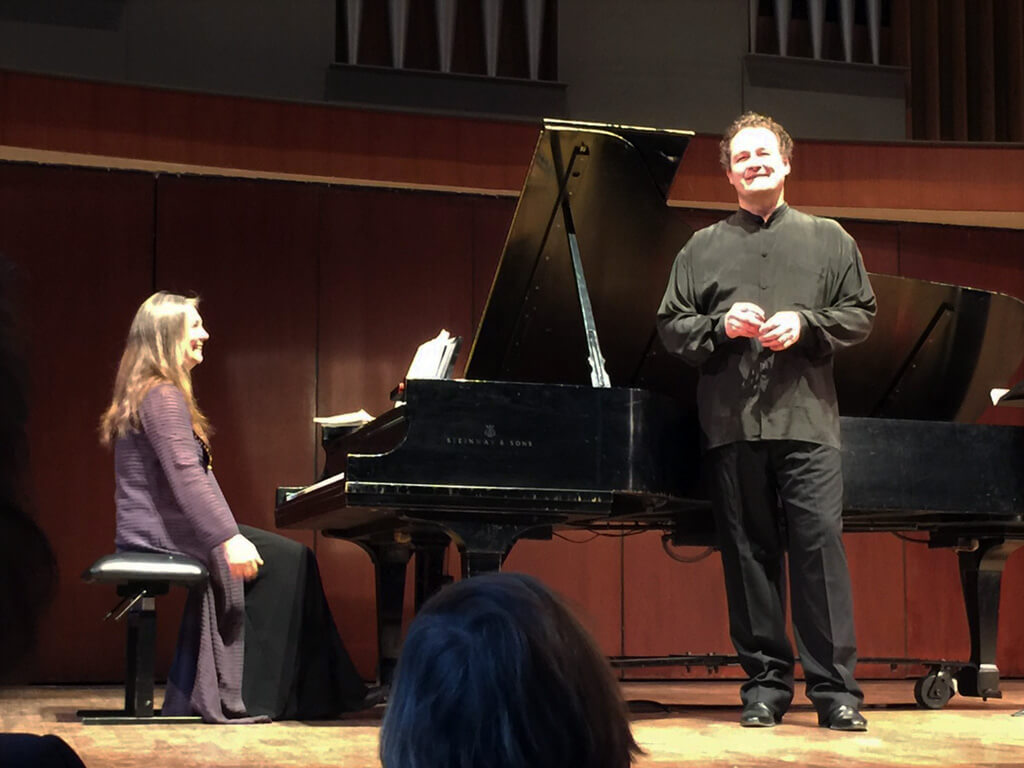
Russell Braun, baritone; Carolyn Maule, piano. Royal Conservatory Songmasters Series Concert 2, Sunday, Jan. 21, 2 p.m. Mazzoleni Concert Hall.
As I was leaving Mazzoleni Hall after the concert Sunday afternoon, I kept thinking that the recital season really started off on a high note with this recital. I have no doubt it will end up as a highlight of the year for me. To be sure, 2018 is barely three weeks old, so it’s a bit premature. What is not in doubt is how uncommonly satisfying this recital was, one that combined thoughtful programming, a personalized touch, and a delivery marked by musicality and heartfelt expression. That goes for the rock-solid support of the pianist as well, Carolyn Maule, who happens to be the wife of the singer.
It’s common knowledge that the vocal recital genre is a hard sell in Toronto. Therefore it’s remarkable that this one was sold out way in advance, albeit in a small venue of 237 seats. It’s also a testament to the reputation of the soloist and the interesting program. I know there were some disappointed folks who left it too late to purchase tickets. The tiny, old-style space of Mazzoleni Hall with its good acoustics is ideal for such just an intimate Liederabend. Braun began the first half with three familiar Mendelssohn songs, “Venezianisches Gondellied,” “Die Liebende schreibt” and “Neue Liebe,” followed by Schumann’s great song cycle, Dichterliebe.
At 52, Braun is at what one would call “mature prime.” He has been singing for over twenty-five years, and his lyric baritone has darkened, and he has moved onto heavier repertoire such as Conte di Luna. A bit of wear and tear is to be expected, but there’s hardly any; one is struck by his still firm and warm tone. I don’t think I’m an ageist if I say these three Mendelssohn love songs are typically sung by younger singers with lighter voices. That said, Braun’s baritone is still capable of the requisite delicacy and mezza voce, even if the sound is a touch too robust at times. It took him a few songs to warm up, as there were traces of heaviness in the beginning. It was an auspicious start to the recital.
Dichterliebe as a cycle demands a wide spectrum of expressions, of tempi and colours. Braun was able to change moods without fuss or muss, from the soft, reflective “Monat Mai” — lovely hushed piano on ‘Verlangen’ — to the quick-silver “Die Rose, di Lilie, die Taube, die Sonne,” to the gravitas of “Im Rhein, im heiligen Strome.” Throughout the cycle, he showed careful attention to the text. A hurdle for low voices in this cycle is the high A in “Ich grolle nicht,” but Braun dispatched it with aplomb, on pitch, fortissimo, and without any sign of strain. In the more dramatic songs, his approach was surprisingly operatic, but never bombastic or overbearing. Carolyn Maule played the final coda of “Die alten, bösen Lieder” very nicely, the only place in the cycle that allows the pianist a bit of a solo.
Braun explained to the audience that the second half was a continuation of the journey of the first, with an exploration on aspects of ageing. He opened with “Father William,” a piece the late Czech-Canadian composer Oskar Morawetz adapted for and dedicated to Russell’s father, the late baritone Victor Braun. Based on text by Lewis Carroll from Alice in Wonderland, dialogue between father and son. I admit I was rather astounded by the outsized, exaggerated emotions – complete with demonic laughter — in Braun’s interpretation, which brought a laugh from the audience.
The next group was L’horizon chimerique, a cluster of four songs by Fauré, with text about the young protagonist’s sea journey. After the rather angular and edgy Morawetz piece, the Fauré felt distinctly like balm to the ear! The group that I was most interested in was the last, four songs by Carl Loewe. My only exposure to Loewe when I was a university student was his “Erlkönig,” as a comparison to Schubert’s. It was only later that I discovered other wonderful pieces by Loewe. It was great to hear Braun sing it so vividly, or should I say demonically — his dramatic outbursts almost made me jump out of my seat!
Even after such a big sing, Braun generously offered two encores. Schubert’s “Wanderers Nachtlied” was delivered in a beautiful mezza voce. It was followed by a gorgeously sung, if abridged, “O du mein holder Abenstern,” Wolfram’s aria from Tannhauser. Wolfram is one of Russell Braun’s best roles, just like his father before him. I interviewed Russell at his home in Georgetown around 2001, when he was singing his first Don Giovanni in Quebec. I vividly recall his telling me that his father for a long time discouraged him from going into the profession. Yet the younger Braun persevered and has since became the great artist that he is today. If somewhere in the universe, the elder Braun could hear his son sing Wolfram’s aria so beautifully, I’m sure he would have approved. A wonderful way to spend two hours on a dreary winter Sunday afternoon.
LUDWIG VAN TORONTO
Want more updates on Toronto-centric classical music news and reviews before anyone else finds out? Follow us on Facebook or Twitter for all the latest.
![]()



